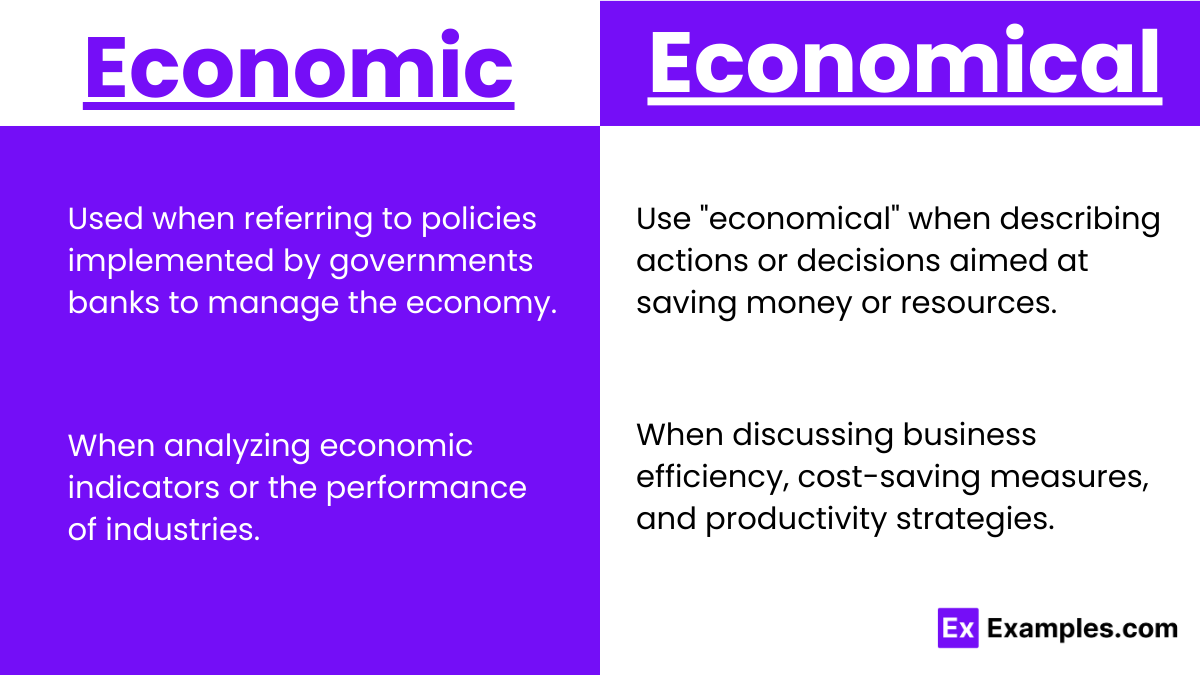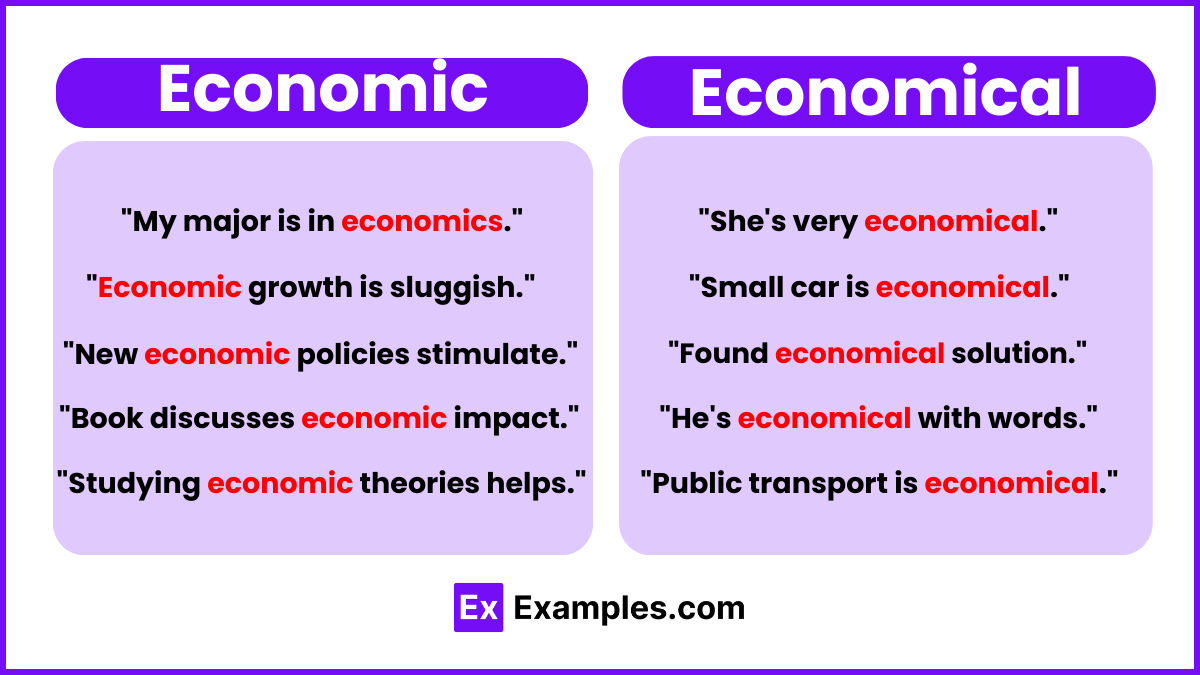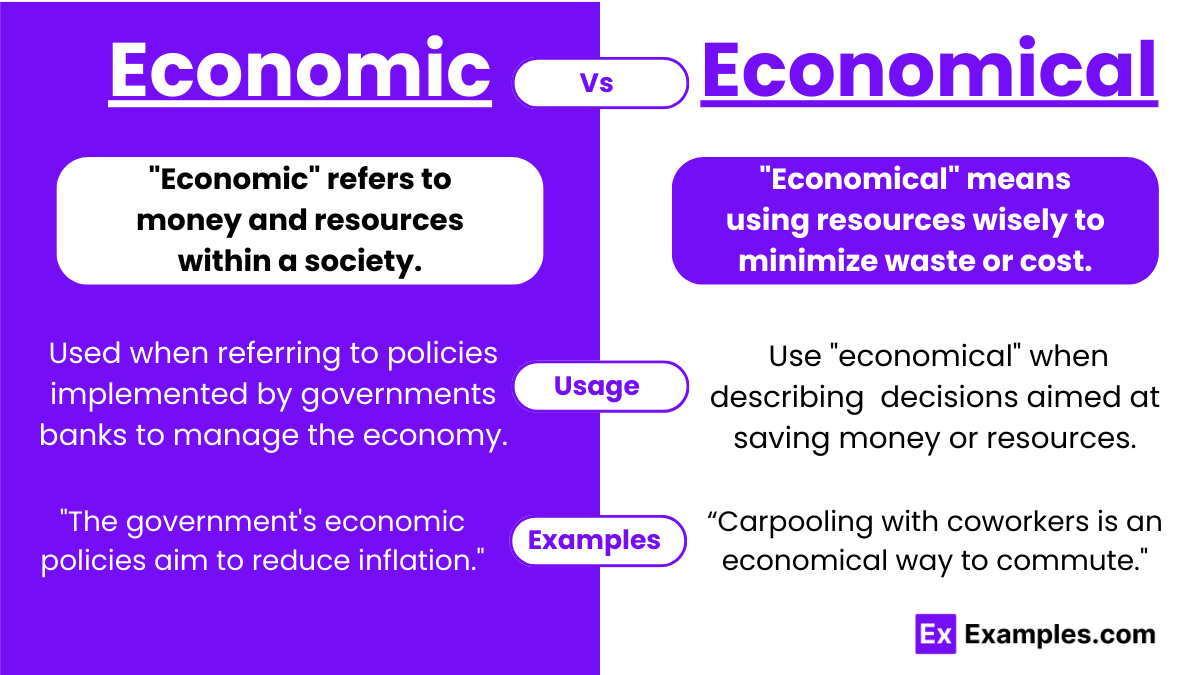Economic vs Economical – Meanings, Differences, Usage, Examples
Economic and Economical are two words that often cause confusion. Although they sound similar, they have different meanings. “Economic” relates to money, trade, and industry, while “economical” refers to using resources wisely to save money. Understanding the difference between these terms can help you communicate more clearly when discussing finances.
Economic and Economical – Meanings
- Economic: It is an adjective used to describe anything related to economics, the economy, or financial matters. It pertains to the broader system of production, distribution, and consumption of goods and services within a region or country.
- Economical: It also an adjective, refers to being efficient with resources, especially in terms of saving money or time. It focuses on thriftiness and avoiding waste.
Summary
How to Pronounce Economic and Economical
- Economic: Pronounced as /ˌiː.kəˈnɑː.mɪk/.
- Economical: Pronounced as /ˌiː.kəˈnɑː.mɪ.kəl/.
Differences between Economic and Economical
| Aspect | Economic | Economical |
|---|---|---|
| Focus | Broad systemic view of economic activity. | Minimizing costs and maximizing efficiency. |
| Impact | Influences overall economy indicators. | Affects individual or organizational budgets. |
| Policy vs. Practice | Economic policies by governments. | Practical resource management. |
| Time Horizon | Considers short and long-term trends. | Immediate gains with potential long-term benefits. |
| Complexity | Involves complex economic theories. | Involves straightforward decision-making. |
How to Remember the Difference between Economic and Economical
- Focus of Use: “Economic” relates to broader economic concepts, while “economical” refers to efficiency in resource usage.
- Similar Endings: Both words end in “-ical,” but “economic” refers to matters of the economy, while “economical” pertains to efficiency.
When to Use Economic and Economical

Usage Economic
- In discussions about government policies, market trends, and international relations.
- When analyzing economic indicators or the performance of industries.
- To describe broader economic concepts and global economic issues.
Usage Economical
- In personal finance discussions, such as budgeting and expense management.
- When discussing business efficiency, cost-saving measures, and productivity strategies.
- To describe products or services that offer cost savings or efficient resource usage.
How To Use Economic and Economical
Economic
- Discussing Macro-Level Concepts: Employ “economic” when discussing broader economic concepts, such as GDP, inflation, or fiscal policies.
- Referring to Economic Policies: Use “economic” when referring to policies or measures implemented by governments or central banks to manage the economy.
- Analyzing Market Trends: Utilize “economic” when analyzing market trends, trade patterns, or the impact of global events on the economy.
Economical
- Describing Cost-saving Measures: Use “economical” when describing actions or decisions aimed at saving money or resources.
- Referring to Efficient Practices: Employ “economical” when discussing practices or methods that optimize resource usage.
- Discussing Budgeting Strategies: Utilize “economical” when discussing budgeting strategies or decisions aimed at maximizing efficiency.
Economic vs Economical – Examples

Economic Examples
- The government’s economic policies aim to reduce inflation.
- Economic growth is crucial for job creation.
- The stock market is a key indicator of economic health.
- Trade agreements can boost economic activity between nations.
- Economic downturns often lead to budget cuts in public services.
Economical Examples
- Buying generic brands is an economical way to save money on groceries.
- Carpooling with coworkers is an economical way to commute.
- Using energy-efficient appliances can be highly economical in the long run.
- Repairing clothing instead of buying new items is an economical choice.
- Packing your lunch instead of eating out every day is an economical habit.
Synonyms for Economic and Economical
| Economic | Economical |
|---|---|
| Financial | Cost-effective |
| Monetary | Thrifty |
| Fiscal | Budget-friendly |
| Commercial | Frugal |
| Trade-related | Efficient |
Exercises
- The government’s __________ policies aim to boost job creation.
- Buying in bulk is a __________ way to save money.
- Renewable energy sources are essential for __________ sustainability.
- Repairing old furniture instead of buying new is an __________ choice.
- The stock market is a key indicator of __________ health.
Answer
- economic
- economical
- economic
- economical
- economic
FAQ’S
Does Economic Mean Cheaper?
“Economic” pertains to efficient resource use; “cheaper” suggests lower cost. Economic factors include utility and opportunity cost, not solely price.
What is Economic or Economical Growth?
“Economic growth” expands production; “economical growth” implies efficient resource usage for growth, emphasizing cost-effectiveness and sustainability.
What is Another Word for Cheap Economical?
Synonyms include “affordable” or “cost-effective,” signifying value without excessive expense, aligning with efficient resource allocation.
How Do Economic Policies Affect Individuals?
Economic policies impact individuals through taxation, employment, inflation, and access to goods, influencing livelihoods, standards of living, and purchasing power.
Why is it Important to be Economical?
Being economical promotes resource efficiency, prudent spending, and sustainability, reducing waste and maximizing utility for long-term economic stability.


